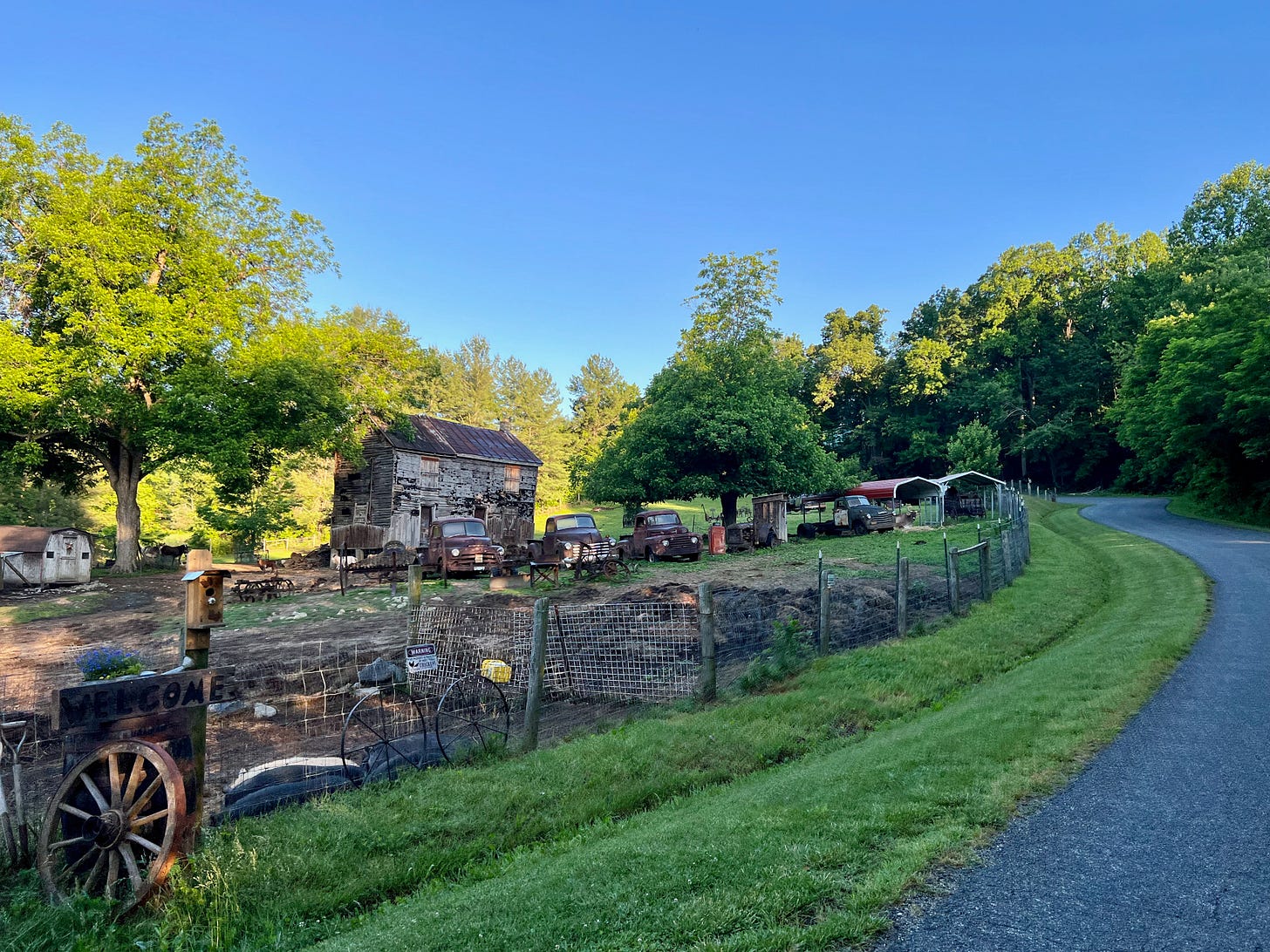Note: You may need to click through to read the whole thing. This month, a lot about the changing market, inspection conversations, new normal, a trip to the beach, and a new phase. If you like this note, please forward to a friend.
The market transition
tl;dr: the market is changing, and what we’ve become accustomed to has changed. Questions? Ask me.
I started this section in the first few days of June, and have re-written it at least three five six times. My “econ” twitter list has been active as everyone learns about this market.
In short, I think we’re in a transitioning market rather than a transitory market; everything is different now.
This is a bit of a scary time in the real estate market. In the end, it will be OK. The move from a super-hot, multiple offer, escalating offers market to a much, much more conservative and even aggressive pricing strategy market has been fast.
One of the most important parts of what I do is help manage expectations of my clients. Two recent emails, one from a buyer and one from a seller’s agent, on a house my buyer lost out on in a multiple offer situation:
“We have thought about it and have decided to rent for a year before buying, hopefully to give the housing market time to settle! If it is okay with you we would love to reach out again next year when we are looking again.”
“They are all over the place, even wondering if they should just wait for other offers, which I am advising against.”
My response to the buyer was that I’ll absolutely be here next year and that I thought they were making a good decision. I’ve said the same thing to quite a few buyers recently. Twelve years ago I wrote that I think people moving to Charlottesville should rent first; I still think that’s the best advice.
My response to the seller’s agent was echoing her advice that waiting for other offers likely wouldn’t yield more offers. I suspect that those sellers were basing their expectations on the market from a few months ago rather than today’s reality.
I wrote this on 12 June in my post, Inventory Up, Price Reductions Down.
The market from earlier in the pandemic that may be helping sellers set their own expectations is gone. As I’ve told clients, “What your neighbor got for their house four months ago, and how fast, and with however many offers, is irrelevant.”
Ali Wolf tweeted “If someone could afford the monthly payment of a $450,000 home at a 3% interest rate, the equivalent payment at a 6% interest rate is for a $316,000 home.”
I’m writing offers now with interest rate caps of 6.5%, and I’m thinking 7% might be next. And in the future, rates will fall again, and people will refinance. We will be fine.
Take a $600K house, with 20% down, at 3.25% interest = PI of $2,089/month. Principal + interest (not including taxes and insurance).At 6%, for that $600K house, the PI is $2,878.
At 6%, a $2,086 monthly payment with 20% down will get you a $435K house.
Sellers, keep the above in mind when pricing your home; better yet, let’s talk it through together.
I’ve written “new normal” countless times over the years; whatever is happening today is our normal.
NB: I use Karl’s Mortgage calculator, and include taxes and interest; not every online mortgage calculator does.
New Normal in Charlottesville now
Aggressive pricing by sellers
Some properties are still moving with multiple offers and bidding wars, but far fewer than we’ve become accustomed to.
Days on market increasing
Inventory increasing
Buyers’ affordability has been hit hard
Fewer buyers in the market
Maybe more cash offers?
More buyers choosing to wait and see what happens.
Fewer inspections being waived.
In March, I wrote, "Mortgage rates around 5%? What does that mean to buyers and sellers in Charlottesville?” Life and the market come at you fast. For more questions I’m thinking about, see this post in May and this one too. So many more questions than answers right now.
Agent Population? Waiting for the inevitable decline of agents.
Lastly, Mike puts out great real estate data content, and much of it’s relevant for our market. Rates, inventory, prices - most of it tracks with what I’m seeing.
Keep this in mind.
Things will be ok.
Thinking about buying? Start here. Selling? Start here.
Inspection Conversations
Over the years, I’ve attended countless home inspections, heard a lot of questions and answers, and seen a lot.
At the end of every home inspection, regardless of the home inspector, we have a conversation summarizing the findings. The reports inspectors use are thorough, with lots of words and pictures, and have a lot of information.
That said, nothing can replace the conversation I encourage my buyer clients to have with the inspector at the end of the inspection. This is where I ask the questions buyers don’t know to ask, where we learn some basic things about the house - main water shut valve, size of HVAC air filters, what are GFCI and arc fault breakers, how old is the roof, and when should it be replaced. So many questions and answers that go well beyond “is this item serviceable?”
As I tell my clients - come for the inspection; stay for the conversation.
Beach with Walker
My wife and I went away for a couple of days recently and did not tell anybody. I got some work done, did not have any clients to show, and we just enjoyed being together in a different place. It was amazing, and while not a replacement for our postponed because I got Covid 20th anniversary trip, it was great.
For a couple of days, it was almost as if I had a job with “regular” hours and responsibilities -- no showings due to the slowing market, a lot of client communication, some writing, and even a short interview with NBC29 about inflation. I could almost imagine a life working in a new place every few weeks or months. It’s fun to daydream.
I started to understand Airbnb‘s recent app’s redesign which offers different ways to search, including for longer stays.
How Loud is the Train?
The client loved the townhome and the location, but had concerns about how often the train went by and how loud it was. The house is about 120 feet from the train tracks.
We visited the house dozens of times. (It was a different market, and there were some interesting issues.) She never heard the train during any of her visits.
She finally heard it on the morning of our final walkthrough before closing. Her reaction was, “Huh. That’s not bad.”
Buy Now. Pay (and Pay, and Pay, and Pay) Later.
I don’t know enough about Buy Now, Pay Later, but I’m curious about how many of my clients are using options like Klarna, AfterPay, and Affirm. I can’t see how this is a good thing, if only for my friend’s comment below, or, right or wrong, for the fact that not building a credit history is poor planning.
I was talking to a friend about Buy Now, Pay Later and he sent me this:
While I don’t have an educated answer on these programs, they clearly are not good for setting up young people for success.
Two very distinct issues:
1st, you are taking on debt that will need to be repaid. Much like the deferment of student loans all these many months, the bill will come due and the budgeting part may not be there. The new debt load could push borrowers out of a qualification range.
2nd, consumers are encouraged to take on debt – any debt to get what they want. This generation is growing up with a distorted concept of what it means to be successful. I want, I want, I want.
My last car had I think 280K miles on it before I donated it. My current car has a 2.0 liter, not 3.0, so it doesn’t race off the line. And, for that, I negotiated down to $48,000 from $60,000 (pre-COVID). Reliable transportation that I can drive for 8-10 years is what I care about. Kids today can qualify to buy crap they don’t need.
Now get off my lawn. :)
Related, for those who saw that Apple is now getting into the Buy, Now Pay Later business: “Apple Pay Later appears to simply be in the business of allowing users to split purchases into multiple payments, interest-free, with complete privacy.”
Friend/client: How do I get out of my 2.75% Mortgage?
“I’d like to sell, but I have a 2.75% mortgage, and when I buy, I’d be buying at ~6%; not sure I can/want to do that.”
I think this is going to be an ongoing challenge. It’s too soon to speculate, but I read somewhere recently that the asset is not necessarily the house, but the mortgage. I wonder if we’re going to be seeing more assuming of mortgages.
A new phase.
The picture above is my younger daughter’s high school graduation. I noted on IG that what she and all these kids have been through in the past four years is remarkable. She kicked ass and we could not be prouder of her.
Life experience helps me better serve and represent my clients; I can hear and empathize with their needs and wants better because I’ve had little kids, dogs, and now a grandchild. Here's to our next phase as empty nesters.
A tip for buyers:
If your agent doesn’t have MLS or lockbox access to the house you want to see; are they the expert you need to represent you?
What I’m Reading
How AI is Remaking House-hunting. Glenn Kelman is one of the smartest people out there.
Virginia launches world’s biggest 3D-printed housing project
Redfin (RDFN) to reduce number of employees by approximately 470 employees, 6%
Remote learning apps shared children’s data at a ‘dizzying scale’
How to Purchase a Firearm in Canada. Related: Wisdom from John Witherspoon.
It’s Complicated to Retire Abroad. Here Are 4 Considerations Before Diving In.
What I’m Listening to
How to Save a Planet with Kendra Pierre-Louis - This is a fantastic episode & discussion about bicycles, infrastructure, climate, economic development… Our society has an opportunity to remake how we live. Would be cool if we would take it.
I’m up to Dick’s Picks Volume 10 - Winterland Arena, 12/29/1977 as I make my way through all of them.
Next month
Evolving opinions, being able to write well, and a bit more I’m sure. Ideas and topic suggestions welcomed!
—
If you made it this far, thank you so much for reading!
— Jim










